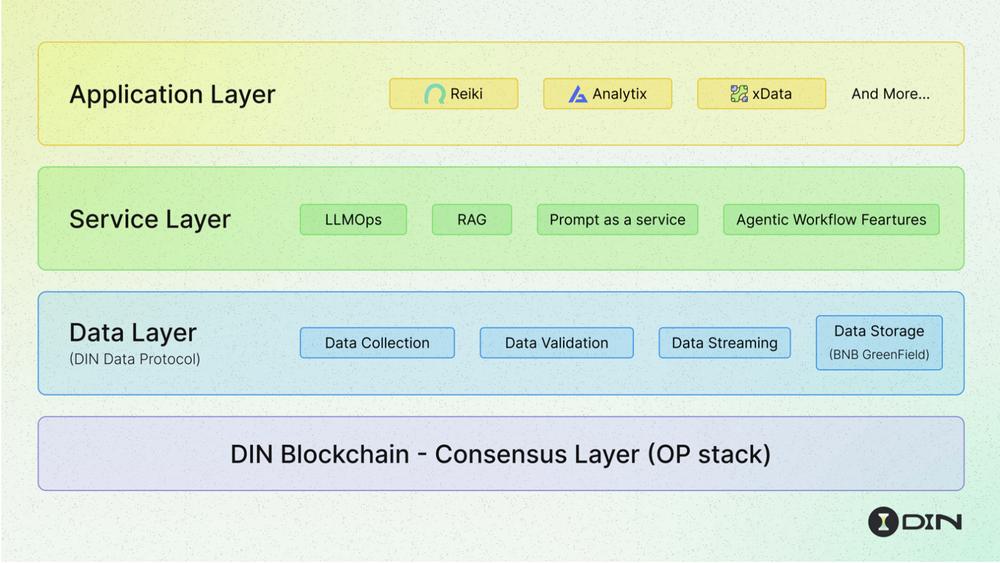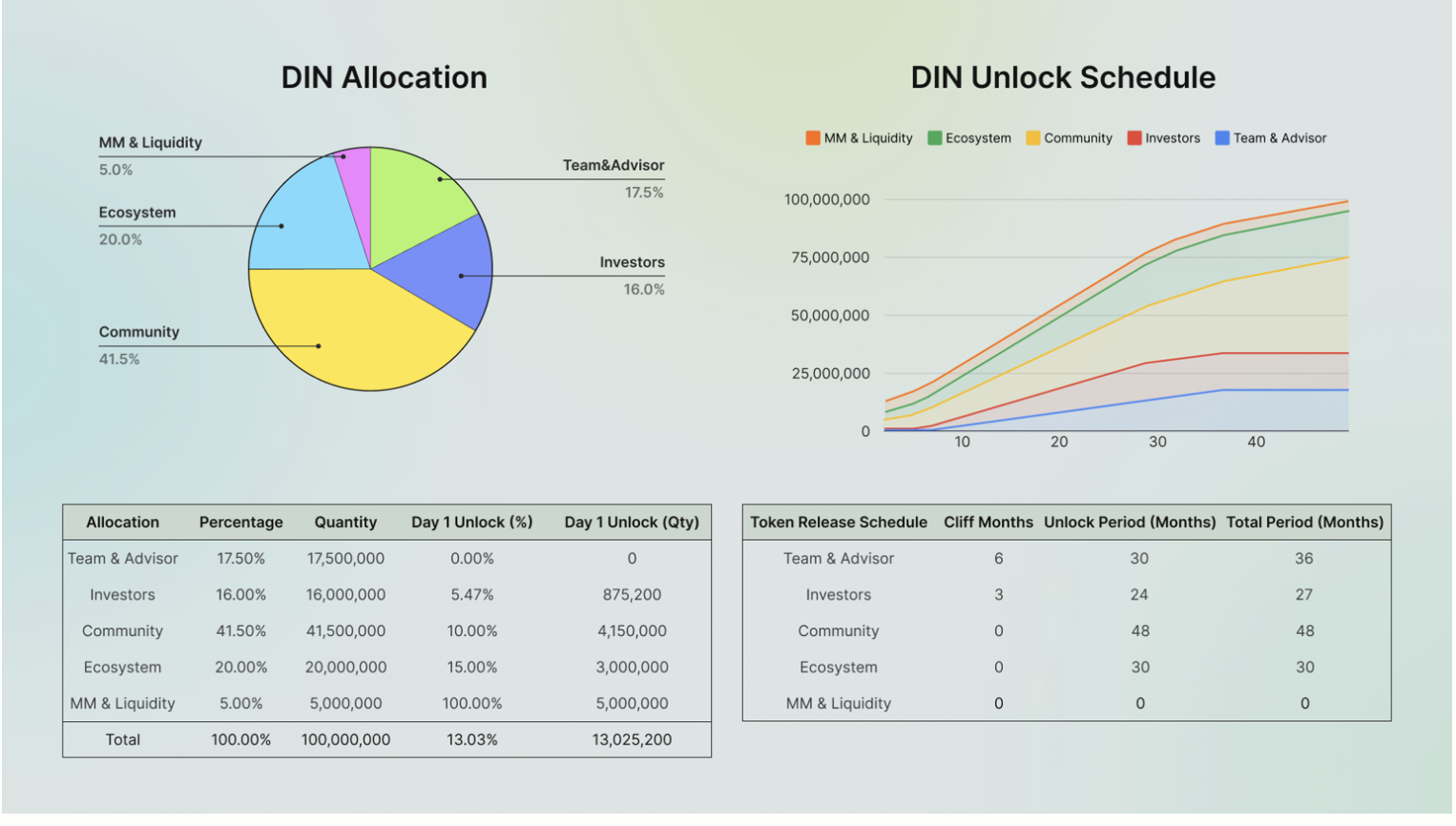Author: Nancy, PANews
In recent days, the MEME coin TST, which was "named" by CZ, has gained popularity, with its market value skyrocketing shortly after listing on Binance, bringing the BNB Chain ecosystem back into the market spotlight. In this wave of market enthusiasm, DIN has been a long-term builder in the BNB Chain ecosystem, recognized and supported by Binance. This year, the project announced the launch of the AI Agent blockchain and officially started the TGE (Token Generation Event) on February 14.
AI Agent is a popular track at the moment, and the market has already seen "smoke signals" rising. Recently, the strong presence of DeepSeek has accelerated the reconstruction of the AI landscape and validated a profound industry rule: in technology-driven competition, technology itself is not the only decisive factor for success; cost control and efficiency improvement are the core competitive advantages.
This principle is equally applicable in the AI Agent field of the on-chain world. As one of the core driving forces of this crypto cycle, Web3 AI Agents, with their autonomy, intelligence, and collaborative capabilities, have attracted significant attention and funding. However, to truly become mainstream participants in the on-chain economy, AI Agents must not only overcome the phase challenges of market sentiment recovery but also address the long-term issue of continuously attracting liquidity in a volatile market. In this process, DIN provides comprehensive infrastructure for AI agents and dAI-Apps by solving key issues such as data and execution environments, thereby promoting the implementation and expansion of AI Agents in the on-chain economy.
From Data Processing to Agent Building, Creating Dedicated Infrastructure for AI Agents
"No one can complete all their work before going to bed at night; businesses also need to spend a lot of time monitoring things. Creating AI agents can not only replace some tasks and assist businesses in detection but also improve work efficiency and save time," noted Gene Alvarez, Vice President and Analyst at Gartner. AI Agents are deeply integrating into our daily lives. According to Gartner's predictions, by 2028, at least 15% of daily work decisions will be autonomously completed by AI agents.
Compared to AI Agents in the Web2 world, the blockchain environment effectively addresses data storage and inference verification issues. Through off-chain storage protocols (such as IPFS, Arweave, etc.), AI Agents can access large-scale, dynamically changing data while ensuring data integrity and immutability. Additionally, technologies such as zero-knowledge proofs (ZKP) or trusted execution environments (TEE) provide verifiability for the AI inference process, enhancing system transparency and auditability, thus avoiding the emergence of "black box" issues.
Currently, the development of AI Agents in the crypto space is rapid. In addition to MEME, various frameworks, launchpads, and application projects are continuously emerging, gradually perfecting this track. According to Messari's predictions, by the end of 2025, 90% of on-chain transactions will no longer be manually operated by humans but will be automatically executed by a group of AI Agents.
However, the rise of diversified applications such as intelligent trading, data analysis, and complex decision support systems also poses more comprehensive challenges to the infrastructure of AI Agents. For instance, many AI Agents operate independently, making it difficult to efficiently collaborate across different platforms, protocols, or chains, and they cannot effectively share information or coordinate actions. Additionally, as data is dispersed across different chains or platforms, AI Agents cannot fully utilize diverse data sources both on-chain and off-chain. This lack of effective integration mechanisms creates data silos, making it challenging for AI Agents to obtain comprehensive and timely market data, thereby limiting their decision-making capabilities and performance. This is also why previous AI Agents like AIXBT did not always provide accurate analyses. Furthermore, while AI Agents rely on high-quality data inputs, efficiently and securely sharing data remains a significant challenge, especially in the crypto dark forest, where cross-platform or cross-chain data sharing becomes complex, and the lack of standardized data formats and interfaces leads to low data exchange efficiency. Additionally, the lack of transparency hinders users and developers from understanding the decision-making processes and behavioral logic of AI, potentially leading to unnecessary risks and misoperations.
To better leverage the technological potential of AI Agents, DIN has built dedicated infrastructure to meet the requirements of data processing, intelligent decision-making, computational power, and multi-agent collaboration.

In terms of security, it is well known that when AI agents make decisions on-chain, ensuring the credibility and transparency of the decision-making process is crucial for building user trust and ensuring system fairness. To this end, DIN provides decentralized security through its consensus layer built on the OP Stack, utilizing the security of the BNB Chain. This layer ensures the transparency and immutability of operations and decisions, providing a reliable execution environment for AI Agents.
Regarding data processing, high-quality data is the foundation for AI Agents to make intelligent decisions, and robust data support and management capabilities are key to ensuring that this data effectively supports AI Agent decision-making. In the complex blockchain environment, DIN's data layer can provide efficient on-chain and off-chain data processing, supporting the development of AI dApps and AI Agents, and offering real-time data support for large-scale AGI models and AI Agents. Currently, DIN has attracted over 30 million registered users and has processed and stored over 100 million encrypted tweets on-chain, all securely stored on BNB Greenfield, with users able to earn rewards through contributions.
In the creation and deployment of AI Agents, developers often face high technical barriers, typically involving complex model development, blockchain smart contract writing, data processing, and security design. DIN's service layer provides LLMOps for model deployment and operation, Prompt as a Service for prompt engineering support, and Agentic Workflow, simplifying the creation and deployment process of AI Agents, enabling them to efficiently execute complex tasks. Additionally, DIN's service layer supports multi-agent collaboration through RAG (Retrieval-Augmented Generation) and Agentic Workflow, allowing for improved efficiency and optimized decision-making in different fields and application scenarios, as well as smarter behavior in complex environments. RAG provides efficient knowledge search, indexing, and retrieval, facilitating data sharing and collaboration among different AI Agents; Agentic Workflow offers a visual workflow interface to help build and manage complex tasks for multi-agent collaboration, supporting seamless cooperation among agents.
It is worth mentioning that DIN has received support from NodeReal, a Rollup service provider that offers high-performance API services and one-stop application chain solutions, with advantages such as low gas fees and high throughput, reducing user participation barriers and meeting the high-frequency operational needs of AI data scenarios. Additionally, NodeReal is a strategic partner in the BNB ecosystem, bringing resources from BNB ecosystem users and developers.
Four Core Applications Launched, TGE Officially Started
AI Agents are not just a technical tool; their core value lies in how to integrate these capabilities into a broader ecosystem to create new value streams. Currently, DIN has made substantial progress in AI Agent applications, launching four self-developed dApps and achieving significant results.
Among them, Analytix is an on-chain data analysis platform primarily used to help users create detailed dashboards to analyze on-chain activities, with clients including BNB Chain, Moonbeam, and Manta Network; Reiki combines AI with user-generated content (UGC), providing creators with customized AI Agents and data set management capabilities, achieving notable success on Product Hunt, ranking first in both "Daily Product" and "Monthly Product," and third in the year-end ranking for 2024; xData, as a revolutionary AI data collection tool, has attracted over 30 million registered users and partnered with AISpeech, OKX Wallet, and Mantle. After completing data collection through xData, DIN also launched Chipper Node as a data validator to achieve high-quality AI data sets. According to official information, Chipper Nodes are the central hub for DIN's data processing, where node holders can verify, classify, clean, and enhance raw data, achieving data validation and vectorization, ultimately generating data fed to AI. Of course, node holders can also earn DIN tokens as rewards during the mining process. The official website shows that there are currently over 56,000 Chipper Node holders, with more than 40,000 nodes running simultaneously.
From this perspective, these dApps not only demonstrate DIN's practical implementation of collecting, storing, and applying on-chain and off-chain data but also provide rich value for commercial use cases on the BNB Chain, thereby promoting the development and innovation of the entire AI Agent track.
In addition to incubating products internally, DIN continues to expand its influence in the AI Agent ecosystem through a series of external collaborations. For example, in December last year, DIN announced a partnership with the AI-driven MEME coin BANANAS31 on BNB Chain, which leverages AI technology to analyze market trends and user behavior for data-driven innovative development, while DIN provides high-quality real-time data support and AI data-driven insights and recommendations for BANANAS31. In January this year, DIN collaborated with Santa by Virtuals to launch a special event for the New Year; in February, DIN partnered with Kappa to help Kappa evolve into a smarter multi-agent system (MAS) through its AI solutions, bringing a richer interactive experience.
Of course, regarding Chipper Node, DIN's AI data validation and vectorization processing nodes currently have over 50,000 node holders globally, with more than 40,000 nodes running simultaneously, contributing sustainable computing power for data processing in the DIN ecosystem.

To promote the development of the DIN ecosystem and incentivize all contributors, DIN has launched token economics and started the TGE on February 14. According to official information, the total supply of the DIN token is 100 million, with 41.5% allocated to the community, 17.5% for the team and advisors, 20% for the ecosystem, 16% for early supporters, and the remaining 5% for market makers and liquidity.
For ecological contributors, DIN has launched a $DIN token airdrop query page. The airdrop will be conducted in two phases:
Phase One: Open to xDIN holders and Chipper node holders, users can check their airdrop shares starting from February 11 and begin claiming from February 14.
Phase Two: Open to participants of the Binance wallet airdrop event and DIN testnet activities, with queries and claims to be conducted within 7 days after the TGE.
As a builder in the BNB Chain ecosystem, the DIN project has also received official support and recognition from BNB Chain. For example, DIN is the only project supported by the BNB faucet, where users could previously claim DIN's testnet tokens through the faucet to directly participate in the DIN ecosystem; DIN is the official storage provider for BNB Greenfield, with all AI data stored on Greenfield.
In addition, in terms of financing, DIN has also received strong support from multiple investment institutions. To date, DIN has completed $8 million in financing, including a $4 million seed round in July 2023, participated by YZi Labs (Binance Labs), HashKey Capital, NGC Ventures, and others; as well as another $4 million round of financing in August 2024, with participants including Manta Network, Moonbeam, and Ankr.
Overall, AI Agents are accelerating to become the narrative mainline of the crypto market, gradually breaking through the traditional MEME coin category and moving towards a more pragmatic and widespread application phase. As projects like DIN gradually lay a solid "foundation," addressing core needs from data processing to intelligent decision-making and cross-platform collaboration, and evolving from foundational technology to upstream applications, the popularity and application scenarios of AI Agents will continue to expand, making this technological frontier more accessible to the general public.
免责声明:本文章仅代表作者个人观点,不代表本平台的立场和观点。本文章仅供信息分享,不构成对任何人的任何投资建议。用户与作者之间的任何争议,与本平台无关。如网页中刊载的文章或图片涉及侵权,请提供相关的权利证明和身份证明发送邮件到support@aicoin.com,本平台相关工作人员将会进行核查。



